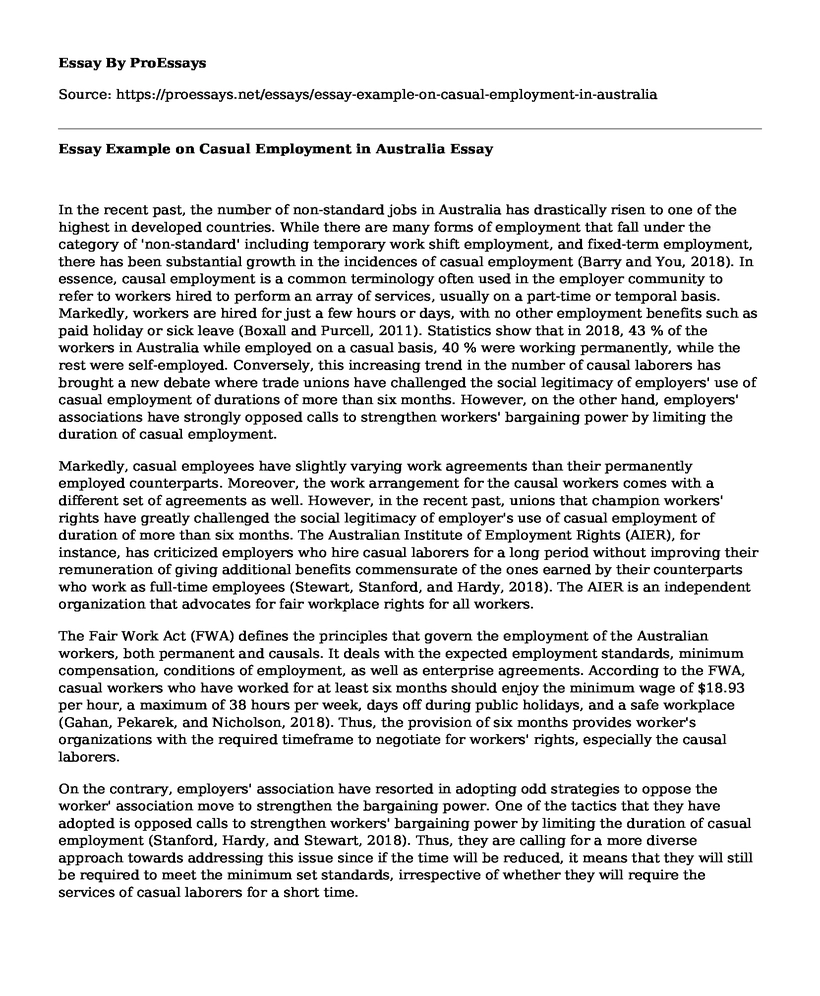In the recent past, the number of non-standard jobs in Australia has drastically risen to one of the highest in developed countries. While there are many forms of employment that fall under the category of 'non-standard' including temporary work shift employment, and fixed-term employment, there has been substantial growth in the incidences of casual employment (Barry and You, 2018). In essence, causal employment is a common terminology often used in the employer community to refer to workers hired to perform an array of services, usually on a part-time or temporal basis. Markedly, workers are hired for just a few hours or days, with no other employment benefits such as paid holiday or sick leave (Boxall and Purcell, 2011). Statistics show that in 2018, 43 % of the workers in Australia while employed on a casual basis, 40 % were working permanently, while the rest were self-employed. Conversely, this increasing trend in the number of causal laborers has brought a new debate where trade unions have challenged the social legitimacy of employers' use of casual employment of durations of more than six months. However, on the other hand, employers' associations have strongly opposed calls to strengthen workers' bargaining power by limiting the duration of casual employment.
Markedly, casual employees have slightly varying work agreements than their permanently employed counterparts. Moreover, the work arrangement for the causal workers comes with a different set of agreements as well. However, in the recent past, unions that champion workers' rights have greatly challenged the social legitimacy of employer's use of casual employment of duration of more than six months. The Australian Institute of Employment Rights (AIER), for instance, has criticized employers who hire casual laborers for a long period without improving their remuneration of giving additional benefits commensurate of the ones earned by their counterparts who work as full-time employees (Stewart, Stanford, and Hardy, 2018). The AIER is an independent organization that advocates for fair workplace rights for all workers.
The Fair Work Act (FWA) defines the principles that govern the employment of the Australian workers, both permanent and causals. It deals with the expected employment standards, minimum compensation, conditions of employment, as well as enterprise agreements. According to the FWA, casual workers who have worked for at least six months should enjoy the minimum wage of $18.93 per hour, a maximum of 38 hours per week, days off during public holidays, and a safe workplace (Gahan, Pekarek, and Nicholson, 2018). Thus, the provision of six months provides worker's organizations with the required timeframe to negotiate for workers' rights, especially the causal laborers.
On the contrary, employers' association have resorted in adopting odd strategies to oppose the worker' association move to strengthen the bargaining power. One of the tactics that they have adopted is opposed calls to strengthen workers' bargaining power by limiting the duration of casual employment (Stanford, Hardy, and Stewart, 2018). Thus, they are calling for a more diverse approach towards addressing this issue since if the time will be reduced, it means that they will still be required to meet the minimum set standards, irrespective of whether they will require the services of casual laborers for a short time.
Conclusion
All in all, in my view, causal jobs offer great flexibility, although they also come along with many challenges. Given the increasing trend in the number of people working as casual laborers, there is need to reduce the minimum set six months to enjoy benefits such as minimum wages, unpaid community leave, among many others. Thus, the government should consider amending the Fair Work Act to address this critical issue.
References List
Barry, M. and You, K., 2018. Employer and employer association matters in Australia in 2017. Journal of Industrial Relations, 60(3), pp.358-377.
Boxall, P. and Purcell, J., 2011. Strategy and human resource management. Macmillan International Higher Education.
Gahan, P., Pekarek, A. and Nicholson, D., 2018. Unions and collective bargaining in Australia in 2017. Journal of Industrial Relations, 60(3), pp.337-357.
Stanford, J., Hardy, T., and Stewart, A., 2018. Australia we have a problem. The wages crisis in Australia: What it is and what to do about it, pp.3-20.
Stewart, A., Stanford, J., and Hardy, T., 2018. The wages crisis in Australia: what it is and what to do about it. University of Adelaide Press.
Cite this page
Essay Example on Casual Employment in Australia. (2022, Dec 26). Retrieved from https://proessays.net/essays/essay-example-on-casual-employment-in-australia
If you are the original author of this essay and no longer wish to have it published on the ProEssays website, please click below to request its removal:
- Application for Child Life Specialist Internship Paper Example
- Diabetes in Texas and Agricultural Projects in San Antonio Essay Example
- Essay Example on Gun Laws in Texas: Debates and Concerns
- Essay Example on Protecting the US Homeland: The 2002 Emergency Preparedness Act
- Essay Example on Criminal Justice in US: Changes Since the Early 1970s
- Chemistry Majors: Preparing for a Multitude of Career Paths - Essay Sample
- Kerner Commission: Addressing Racism - Essay Sample







